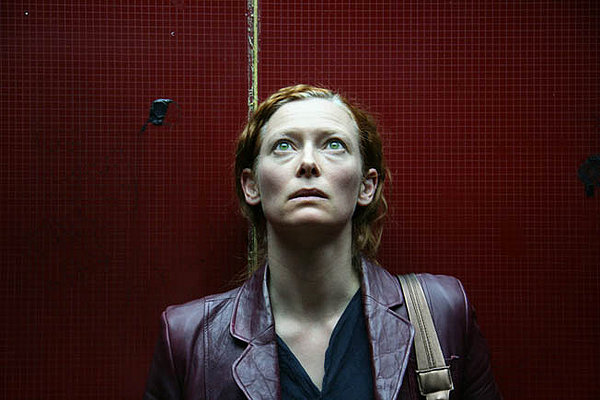
JULIA (2008)
There are few film actresses working today who can embrace the extremes of beauty and ugliness as persuasively as Tilda Swinton, and fewer still, I suspect, who have the guts to try. She’s a magnificent, bold, sometimes viscerally uncomfortable screen presence, with an otherworldly alabaster glow and a piercing gaze that seems to nail you to your seat. (She’s one of the few performers who justifies that overworked critical superlative, riveting.) When she’s on screen, you don’t want to look anywhere, even if the story is so bleak, so utterly and overwhelmingly pitiless that you want to look anywhere but at the screen, at anyone but her.
There are about 20 minutes in her latest, “Julia,” a venture in extreme acting and audience provocation in which she plays an alcoholic child-snatcher, when I wanted to split the theater. Directed by Erick Zonca, who seems to have signed a mutually assured destruction pact with his star, pushing her toward an abyss both might have fallen into, the film is a perverse blend of sadism (the director’s, Julia’s) and masochism (ours, Julia’s). But Ms. Swinton demands to be seen even when her character is on a self-annihilating bender so real that you can almost smell the stink rising off her. So I sat in my seat, cursed the screen and was grateful to watch an actress at the height of her expressive power claw toward greatness.
Claw, crawl, stumble, scurry, fly like a bat out of this hell — Ms. Swinton does it all. She’s yelling with pleasure in the first shot, a gaudy image of her at a Los Angeles nightclub that Mr. Zonca frames from a slight remove so that the camera (and us along with it) has some distance from her. She’s exquisite, with long, spidery eyelashes and a wide-open laugh. Everything looks different with the lights turned low, and so does Julia as she gulps her drinks and finally gives the nod to a guy who cannot believe his luck. But that gulping mouth is more of a maw and in time the lights go up, brutally. The next morning, the glamour is smeared all over her face.
For Julia, every morning is another ugly morning after. Not that she seems to notice or care. Her whole life is organized around booze, about getting to that moment when she’s throwing another one back either alone or in a crowd, it doesn’t matter. There’s no pride here, no real friends, save for the alcohol, which is always there, keeping her company. The one person in her life, Mitch (Saul Rubinek), moons about, trying to help keep her real-estate job (at the pointedly named Reality House) and goading her toward sobriety meetings she refuses to sit through. When a woman at one meeting introduces herself, saying they’re neighbors, Julia fires back, “I’m not really down with the good neighbor” thing. No kidding.
At first, “Julia” seems to be shaping up as a portrait of an alcoholic nearly scraping bottom. The early, naturalistic scenes slip into one another seamlessly with no obvious dramatic arc, which fits with a life that feels similarly unstructured. But the story shifts gears soon after the neighbor, Elena (Kate Del Castillo), drags a passed-out Julia home one evening. The next morning, Elena spins a wild tale. Her only son, Tom (Aidan Gould), is being raised by his wealthy grandfather who refuses to let her visit the boy. But Elena has a plan and, she claims, money, and will pay Julia to kidnap Tom, whom she will then spirit off. Julia doesn’t just listen to Elena’s far-fetched scheme, she also follows through on it.
What transpires is so ludicrous, so improbable and so appallingly messy that it actually registers as far more realistic than most movie crimes, like one of those ghastly news stories about a crazy woman who runs off with someone else’s baby for love or money or just because she’s nuts. The smell of money seems to unhinge Julia, who, after a lifetime of self-destruction, decides she deserves a break. (From what? Herself?) The kidnapping is a disaster, horrible and difficult to watch because it’s always difficult to watch a child in distress, and the young actor makes his character’s fear palpable. It doesn’t help that Mr. Zonca is a French filmmaker — there isn’t a Hollywood beat in his storytelling — which means that any bad thing could happen. That’s a joke, but also true.
However heart-thuddingly real, the crime and some motel scenes that follow are so tonally relentless, so claustrophobic and harrowing that I found myself pushed right out of the movie. It was hard to get back in, particularly after Julia runs over a guy with a car, not once, but twice, a scene that drives the film dangerously toward self-parody. But Mr. Zonca, whose best-known feature is the 1998 drama “The Dreamlife of Angels,”pulls back from the edge just in time, largely by channeling John Cassavetes’s “Gloria,” about another tough broad (Gena Rowlands, who else?) on the lam with a kid. Ms. Swinton doesn’t have Ms. Rowlands’s tenderness, but, damn, she has just about everything else you need or want.
Written by Manohla Dargis, NY Times




